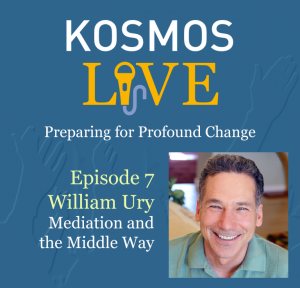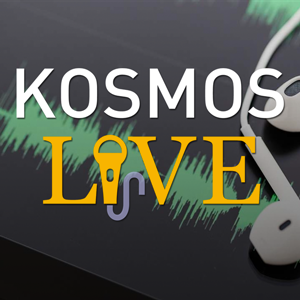KOSMOS LIVE Podcast | William Ury on Mediation and the Middle Way
KOSMOS LIVE PODCAST SERIES Preparing for Profound Change
This podcast series, Preparing for Profound Change, explores the shifting global landscape and offers strategies for coping with what lies ahead. Economic turmoil, climate chaos, political upheaval – these may seem like forces to fear, but in fact offer us deep opportunities for transformation.
 Episode 7 – William Ury, on Mediation and the Middle Way
Episode 7 – William Ury, on Mediation and the Middle Way
William Ury is co-founder of Harvard’s Program on Negotiation, and one of the world’s leading experts on negotiation and mediation. He is co-author of Getting to Yes, the world’s bestselling book on negotiation, and more recently author of Getting to Yes with Yourself. William has served as a negotiation adviser and mediator in conflicts ranging from Kentucky wildcat coal mine strikes to ethnic wars in the Middle East, the Balkans, and the former Soviet Union.
Listen Now
“All the professors and everyone thought the Berlin Wall was going to be there, and the Cold War was going go on for generations, and there was Northern Ireland.. South Africa. Apartheid…and yet I watched, and participated, and visited all those places, and worked in all those places, and watched as conflicts, that we thought were seemingly impossible, gradually gave way to – not the end of the conflict – but the transformation of the conflict. That’s what’s key. Sometimes, we think it’s end of the conflict. Well, conflict is part of life, but to change the form of the conflict from a destructive form of war, violence, oppression, to a constructive form of dialogue, negotiation, democracy, nonviolent action, that’s the key.”
“[There’s] an old Tibetan prophecy from maybe 1,000 years ago. It’s called The Shamballa Prophecy, and it’s that at some point in the distant future, there will come a moment when the Earth, itself, is in danger like you’re mentioning, and at that moment in that generation, there will come into being a new breed of warriors, or I would call them healing warriors. They call them Shamballa warriors in the Tibetan prophecy, and they’re endowed with two weapons, and the first one is insight, the ability to really look inside, and that’s where self-forgiveness comes from, and the second is compassion. So, it’s those two valuable tools that are so key right now if we’re going to begin to heal ourselves, heal our communities, and heal our planet.”
“Respect comes from the Latin, which means to look again, to see the human being there, and the most common behavioral way in which we show respect is actually to listen, and we’re in a world right now, which is all about talking, and everyone’s talking, and they’re talking past each other, and we have talk shows. We need listen shows…”
“As someone who’s been very active as a mediator in negotiations in conflicts around the world, one thing I’ve noticed is that, as I mentioned earlier, we are our own worst enemies, and as the old saying goes, “When angry, you will make the best speech you will ever regret.” We’re reaction machines. So, to me, the foundation of successful negotiation, actually, starts with ourselves..”
Links for this Podcast
Books by William Ury
Getting to Yes with Yourself (And Other Worldly Opponents)
Getting to Yes: Negotiating Agreement without Giving In
The Power of A Positive No: How to Say ‘No’ and Still Get to ‘Yes’
Getting Past No: Negotiating in Difficult Situations
The Third Side: Why We Fight and How We Can Stop
Getting Disputes Resolved: Designing to Cut the Costs of Conflict
Beyond the Hotline: How We Can Prevent Crisis that Might Bring on a Nuclear War
Must We Fight? A New Perspective on Violent Conflict and Its Prevention
Windows of Opportunity: From Cold War to Peaceful Competition in US-Soviet Relations
In Kosmos Journal
New Approaches to Healing Collective Conflict and Trauma: Our Responsibility as Global Citizens
Referenced in this Podcast
Conflicts
Credits
 This Kosmos Live series, Preparing for Profound Change, is made possible by Immediacy, leading creators of educational media for learners of all ages everywhere. And, by Kosmos Community, dedicated supporters of the Kosmos mission – transformation in harmony with all Life.
This Kosmos Live series, Preparing for Profound Change, is made possible by Immediacy, leading creators of educational media for learners of all ages everywhere. And, by Kosmos Community, dedicated supporters of the Kosmos mission – transformation in harmony with all Life.Balancing a sober understanding of the of the collective challenges we face, with heart-centered response, calls for deep awakening by individuals, communities and societies. Our guests share their personal practices, strategies, and insights to help us manage our strong emotions and step forward to play positive proactive roles during these troubling times.
What skills, competencies and capacities will be most valued in the new world? How can our own inner practices keep us free from anxiety as we prepare body, mind and spirit for profound change? See other episodes in this series here.

